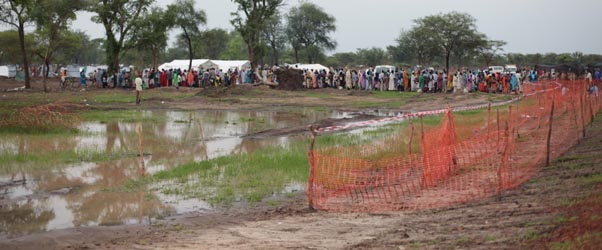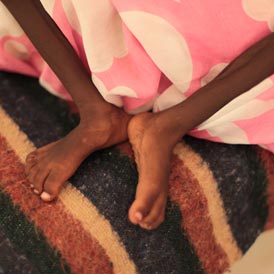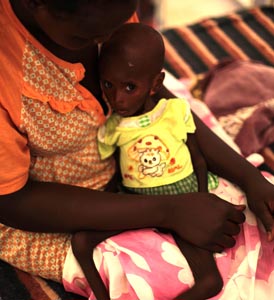Humanitarian disaster in South Sudan
As the world’s newest country approaches its first anniversary as a nation, South Sudan struggles to cope with a refugee crisis that experienced aid workers say is the worst they have ever seen.
In a remote corner of South Sudan, emergency teams admit to being overwhelmed by an influx of 120,000 refugees fleeing fighting which continues to rage across the border in Sudan‘s Blue Nile State.
The Khartoum government has been attacking African tribal groups who got trapped on the wrong side of a line on a map when the two countries split last July.
Tens of thousands have flooded across in recent weeks and more are thought to be on their way.
Hundreds, possibly more than 1,000 people have been killed in the government offensive, which has targetted followers of the Sudan People’s Liberation Army – North, an offshoot of South Sudan’s ruling party based in the Blue Nile State.
There are no independent figures to verify the extent of killings as no journalists or aid group has gained access to the area in the recent bout of fighting.
Relief groups say that long-standing predictions of impending castrophe are being borne out. The current mortality rate in Jamam camp is, on average, about double the threshold of what constitutes ‘and emergency.’
In Jamam camp, nine children are dying every day, two-thirds of them from diahorreal diseases. Medicins Sans Frontieres describes this as “a severe situation.” With more heavy rains forecast, medics are preparing for the worst.
The United Nations refugee agency, UNHCR – which is in charge of the reflief operation – is widely accused of failing to act fast enough to provide the refugees with safe sanctuary.
The refugee camps sit on a flood plain between two rivers fed by rainfall in the highlands of Ethiopia. It was known that the area floods every year and the UN has been fiercely criticised for failing to address the abject conditions facing the swelling numbers of displaced.

UN offcials saythe refugee agency was ‘ambushed’ by the sheer number of new arrivals, crossing the frontier. But relief agencies and their experts have warned this would happen for months.
The Daily Telegraph has also seen documents advising the UN of the impending problem of a large influx dating from as far back as February.
“This is a full-blown emergency”, says Voitek Asztabski of Medecins Sans Frontieres (MSF). “And a full-blown emergency demands a full-blown response. The UN did not have enough capacity, enough contingency or enough resources.”
Stretched to capacity
The refugees – weakened by months on the run, hiding in forests and caves and forced to eat leaves – now languish in shocking conditions, branded “unacceptable” and “terrible” by every relief worker there – without exception.
“We are running from crisis to crisis, fighting overwhelming odds,” says Peter Struijf, who heads the Oxfam team at Jamam camp, where conditions are worst. “I haven’t prayed for a very long time but recently, I’ve been spending a lot of time on my knees.”
An experienced and informed source close to the UN – but who wishes to remain anonymous – says: “Everything and everyone is stretched to capacity. Decisions have been too slow. I find it astonishing that these people are still in Jamam. These scenes should not be happening. I have never seen anything like it.”
Oxfam and MSF say Maban County of Upper Nile State is the worst imaginable location for refugee camps.

Evacuation
They warn of an impending health disaster.
Already mortality rates are double the emergency threshold and diarrhoreal disease and malaria are rife. The death rate for children is even higher. And the spectre of a cholera outbreak – sometimes raised as a much-feared possibility by medical emergency workers in refugee crises – is now considered a very real danger, as pit latrines flood into camps.
For months the relief agencies have been demanding the urgent and total evacuation of Jamam. The UNHCR acknowledges the scale of the problem and is now scrambling to move thousdands of people from flooded sections.
But the refugee agency has been heavily criticised for what other relief groups say has been poor and late decision making and, in some cases, incompetence.
“I think it is absolutely top priority that large numbers of people are evacuated,” says Oxfam’s Peter Struijf.
“This is not a safe place for them to be. We need someone at a higher level to make a strategic decision to solve this problem. We are asking for leadership.”
Frederic Cussigh, who heads the UNHCR field office in Maban County said: “Well, I would definitely agree with the ‘overwhelming problems,’ but it is extremely challenging. Every time it is raining, it makes any movement extremely difficult… When you are in a country where logistical constraints are maximum, it’s ‘multiply every problem by three’. You solve one problem and you create two more.”
Cussigh concedes that siting a refugee camp at Jamam “was obviously not a good idea” but says that the camp sprang up before the UNHCR could intervene. The agency is now in the process of transferring refugees from Jamam to a marginally safer site 40 miles away, although it has been unable to put tents up fast enough.
“I don’t blame the UNHCR. I blame Omar al-Bashir because if he hadn’t shot and bombed us, we would have avoided all this.” A tribal leader tells Jonathan Miller what has happened to his people.
Water shortage
Safe drinking water is in woefully short supply. Bore holes sunk by hydrologists have yielded little and already heavy rains have already begun to engulf the sprawling refugee camps with toxic, stagnant water.
Four years ago, Sudan’s president, Omar al-Bashir was indicted by the International Criminal Court on counts of war crimes and crimes against humanity. Two years later, charges of genocide were added to his indictment.

“Our hearts are broken”
However the government of South Sudan also faces accusations of inflicting harm on the displaced. It has reportedly blocked plans to relocate the camps, citing political and security reasons.
It has also refused repeated requests from aid groups to allow one of its oil companies in the region to provide them with a hydrological survey idenitifying water sources.
Tara Newell, Emergency Coordinator for MSF in Jamam, said: “There are overwhelming problems, but there’s been a completely underwhelming response. This was all predictable. It was, in fact, all predicted.”
However the refugees blame Khartoum for their plight. The tribal chief of the Ingessena tribe, Nassir Efendi Badi el-Tom, now a refugee himself, said:
“We are mountain people. The Ingessena people just want to go home and find peace and finish this terrible war. Our hearts are broken.”
He said that the President of Sudan, Omar al-Bashir “does not want the dark skinned people of Blue Nile State. He called us ‘insects’,” the Nassir said.
While fearing the imminent inundation of Jamam camp he added: “I don’t blame the UNHCR. I blame Omar al-Bashir because if he hadn’t shot and bombed us, we would have avoided all this. If he is not arrested, there will be no solution.”
This article first appeared in the Daily Telegraph.